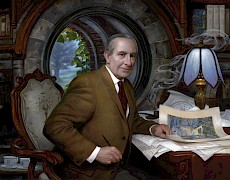☜ Click for full post text.
This is one in a series of posts where the content is provided by a guest who has graciously answered five questions about their experience as a Tolkien fan.
To see the idea behind this project, or if you are interested in sharing your own, visit the project homepage. If you enjoy this series, please consider helping us fund the project using the support page.
I want to thank Donato Giancola for allowing me to use his artwork for this project. Prints are available on his website!
Now, on to David Emerson’s responses:
1. How were you introduced to Tolkien’s work?
Unlike most people younger than me, I first encountered Tolkien when he was virtually unknown in the U.S. This was long before the publications of the paperback editions (the controversial Ace editions, then the authorized Ballantine editions), which thrust them into the public eye, especially on college campuses and among the hippie element (of which I certainly counted myself).
My mother was in the habit of reading bedtime stories to my brothers and me, when each of us was too young to read them ourselves. By the time she got to my youngest brother Ed, we had been through all the children’s books in the house and all the Oz books in the public library, so she casually mentioned to her friend Lydia that she was running out of things to read her son, and asked if she had any suggestions. Lydia’s husband had close family in England, so they had made many trips over there, and had brought back books. Lydia said to my mother, “Hmm, try this,” and plucked a hardback of The Hobbit off her shelf.
As Mom started reading this book to Ed, I would overhear it as I passed by the bedroom door, and it seemed interesting enough that I would stand at the door and listen, even though I was about 14 at the time. After a few nights of this, I realized, “Duh! I don’t have to wait for tomorrow night, I can read the thing myself!” So I started reading ahead, and was entranced by this wonderful fairy tale. When I got to the end and read those portentous words, “If you are interested in Hobbits you will learn a lot more about them in The Lord of the Rings,” I was very excited and asked Lydia if she had those books. She did, and loaned them to me, and that was that! I was suddenly an avid Tolkien fan.
2. What is your favorite part of Tolkien’s work?
I have no permanent “favorite part” any more than I have a permanent favorite song or favorite movie. It changes all the time.
3. What is your fondest experience of Tolkien’s work?
Reading it for the first time.
4. Has the way you approach Tolkien’s work changed over time?
Definitely. At first, it was just so wonderful being swept up in the fantasy of Middle-earth: I had the “Come to Middle-earth!” poster on my wall, I pored over the maps in the backs of the hardbacks, I wrote notes to myself using the Elvish letters from Appendix E. Then when I met more people who had read and enjoyed it, I wanted to talk about it endlessly. Later, I wanted to know more about Tolkien himself, and what other writers had to say, so I read Carpenter’s biography, and the collected Letters and what few analytical books and articles existed at the time. More recently, I have been more interested in the body of literary criticism about Tolkien, reading scholars like Shippey, Flieger, Garth, etc., and attending conferences of the Tolkien Society and the Mythopoeic Society to discuss such works with friends, and even write some of my own research papers. And finally, due to my participation in online discussion groups, I now find myself re-reading The Lord of the Rings once again and appreciating it possibly more than I ever have before.
5. Would you ever recommend Tolkien’s work? Why/Why not?
Years ago, I would have said “Yes!” overwhelmingly. But as Tolkien’s popularity grew, it spawned an entire new genre of fantasy, and it seemed that anyone who was interested in that type of fantasy would either have already read Tolkien or would have their own opinion about whether they’d like it or not, so my recommendation wouldn’t be much use. Now, of course, everybody in the world knows about Peter Jackson’s Lord of the Rings movies, so recommending Tolkien is like recommending air.
On the other hand, there are still newcomers who have only seen the films and are just starting to read the books, and for them I would recommend starting with The Lord of the Rings and then The Hobbit; if they are sufficiently intrigued by the hints of back-story, then I would steer them to *parts* of The Silmarillion, with the warning to expect it to be more like a history than a novel. And I would definitely urge them to read the non-Middle-earth stories “Farmer Giles of Ham,” “Smith of Wooton Major,” and “Leaf by Niggle.”
Then for those who have read as much of Tolkien’s fiction as they can get their hands on, I would recommend the academics: Shippey, Flieger, and Garth to start with. Glyer and Duriez for insight on the Inklings. Essay collections from Walking Tree and the Mythopoeic Press.
